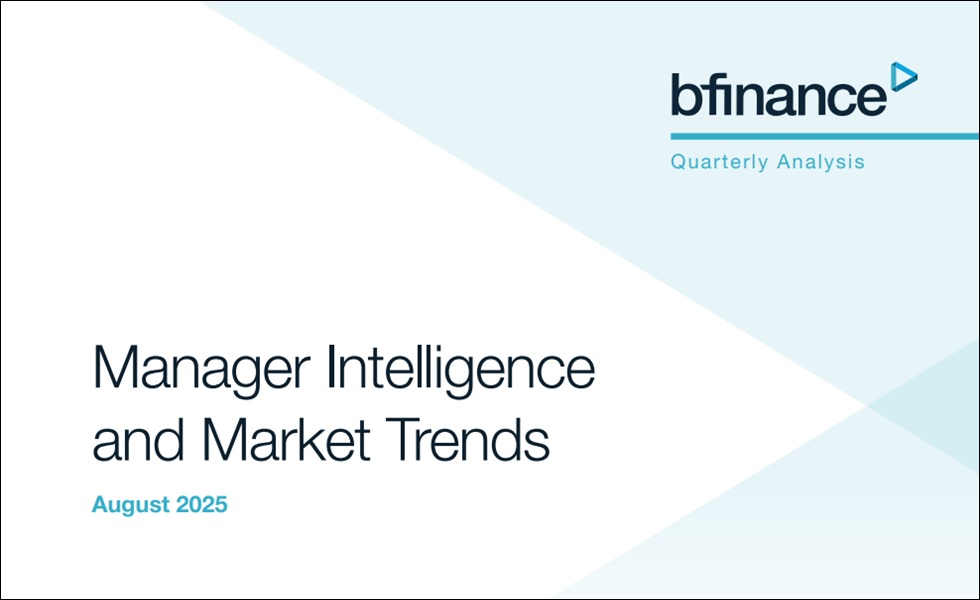bfinance: Investors shift focus to quality and liquidity
bfinance: Investors shift focus to quality and liquidity

The latest bfinance Quarterly Manager Intelligence and Market Trends report from independent global investment consultancy, bfinance, has revealed that institutional investors are demonstrating renewed appetite for quality assets and diversified exposures even as global markets staged a strong rebound in Q2 2025.
Despite a partial easing in caution following the suspension of 'Liberation Day' tariffs, managers kept equity allocations modestly lower, maintained elevated cash reserves, and increased positions in gold and other defensive assets. The report includes data on institutional investors’ asset manager search activity from bfinance’s investor client base across 47 countries.
Investor Activity
Private markets accounted for 49% of new manager searches in the 12 months to June 2025, showing the asset class’s central role in long-term portfolio design through providing illiquidity premia inflation protection and diversification from public market volatility. Private debt remained the largest segment at 43% of private market searches, driven by allocations to direct lending, asset-backed finance, and capital preservation strategies.
Infrastructure searches surged from 8% to 17% year-on-year as institutions sought long-duration, inflation-linked returns. By contrast, private equity fell to 18% of private markets searches, down from 28% a year earlier, highlighting a more selective approach to growth-oriented illiquid investments.
Private markets fundraising was 25% below the five-year average in Q2, signalling continued caution, yet renewed activity in buyouts and real estate suggests investors are re-engaging where valuations and structural themes are compelling. The tilt toward secondaries, value-add, and asset-backed strategies points to a focus on resilience and inflation protection, underscoring a defensive recalibration rather than a return to pre-slowdown risk appetite.
Equity managers dipped slightly year-on-year to 27% of total mandates, with global equity strategies accounting for 46% of this activity. Emerging markets equity reached 36% of equity mandates, the highest share in recent years, signalling a clear move toward geographic diversification and focus on markets such as India, Saudi Arabia, and GCC-focused strategies. This shows improved sentiment following tariff repricing and a recalibration of valuations, particularly in non-US markets.
Fixed income accounted for 13% of total mandates, but the composition shifted notably towards investment grade credit, which increased to 46% of fixed income searches, up from 38% last year, as investors sought yield stability and duration flexibility. This pivot reflects a desire for yield stability, duration flexibility, and capital preservation in the face of lingering rate volatility. Demand for high yield and emerging market debt fell to 9% each, indicating more cautious positioning in higher-risk credit.
Hedge funds dominated the diversifying strategies segment, which made up 11% of total mandates. Equity long/short strategies rose 4.9% in Q2, bringing year-to-date returns to 6.0%, while event-driven funds gained 4.2%. Trend-following CTAs were the weakest performers at -5.8% for the quarter and -9.2% year-to-date, although discretionary macro approaches navigated volatility with more success.
Portfolio design
The bfinance Risk Aversion Index returned to 0.6 from April’s tariff-driven peak of 0.8, reflecting a partial easing in caution after the suspension of 'Liberation Day' tariffs. Yet portfolio data shows that managers kept equity allocations modest, raised positions in gold and other defensive assets, and held elevated cash reserves. These decisions highlight a persistent undercurrent of caution amid unresolved policy, inflation, and geopolitical risks. This is a recognition that the strong rebound in asset prices may not be matched by reduced market fragility.
The report also highlights increasing institutional engagement with 'de-Americanisation' of portfolios, as asset owners reassess the dominance of US equities, the US dollar, and Treasuries as safe-haven assets. Gold’s share of global FX reserves has risen from 6% to 15% over the past decade, while the US dollar’s share has slipped to 54%. This shift points to a more multipolar investment landscape and increased scrutiny of concentrated exposures.
Operational due diligence
Between March 2022 and November 2023, the US Securities and Exchange Commission withdrew 14 proposed rules covering ESG disclosure, cybersecurity, and vendor oversight. While this rollback reduces regulatory burdens, bfinance stresses that operational due diligence is more critical than ever, particularly in private markets and alternative strategies where governance and transparency standards remain vital.
Oliver Wade, Content Lead at bfinance, said: 'Although headline risk appetite appears stable, investor behaviour tells a more cautious story. Institutional portfolios are increasingly tilting toward liquidity, quality, and diversification. The continued strength of private markets, particularly in infrastructure and private debt, reflects a deliberate effort to hardwire resilience into portfolios. Demand is more targeted and risk-aware, with investors positioning for a world that may be more inflation-prone, less dollar-centric, and less reliant on US market leadership.'
Please click the link below to read the full report:





